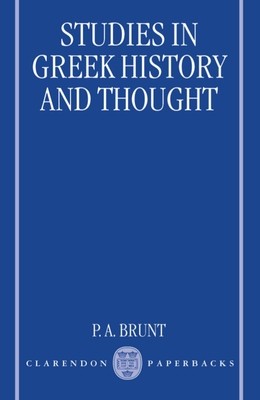
- We will send in 10–14 business days.
- Author: P a Brunt
- Publisher: Clarendon Press
- ISBN-10: 0198152426
- ISBN-13: 9780198152422
- Format: 14 x 21.6 x 2.4 cm, softcover
- Language: English
- SAVE -10% with code: EXTRA
Reviews
Description
This is a collection of P.A. Brunt's writings on Greek history and thought--some previously published in journals and others unpublished until now. Subjects covered include Greek political history of the fifth century B.C. and ancient historiography--including an introduction to Thucydides designed for the more general reader, to which the author has now annexed a new study of Thucydides' funeral speech. Four essays concern the relationship between Greek philosophical thinking and social and political conditions, and of these, three, which constitute about a third of the volume, are new. Two examine the extent to which Plato and his pupils sought, or were able, to make any impact on the contemporary world, and the practicality of the model city in Plato's Laws; the third discusses Aristotle's theory of slavery in relation to the actual Greek institution and to other attempts to justify slavery as well as in the context of Aristotle's own ethical doctrines.
EXTRA 10 % discount with code: EXTRA
The promotion ends in 19d.18:34:40
The discount code is valid when purchasing from 10 €. Discounts do not stack.
- Author: P a Brunt
- Publisher: Clarendon Press
- ISBN-10: 0198152426
- ISBN-13: 9780198152422
- Format: 14 x 21.6 x 2.4 cm, softcover
- Language: English English
This is a collection of P.A. Brunt's writings on Greek history and thought--some previously published in journals and others unpublished until now. Subjects covered include Greek political history of the fifth century B.C. and ancient historiography--including an introduction to Thucydides designed for the more general reader, to which the author has now annexed a new study of Thucydides' funeral speech. Four essays concern the relationship between Greek philosophical thinking and social and political conditions, and of these, three, which constitute about a third of the volume, are new. Two examine the extent to which Plato and his pupils sought, or were able, to make any impact on the contemporary world, and the practicality of the model city in Plato's Laws; the third discusses Aristotle's theory of slavery in relation to the actual Greek institution and to other attempts to justify slavery as well as in the context of Aristotle's own ethical doctrines.


Reviews